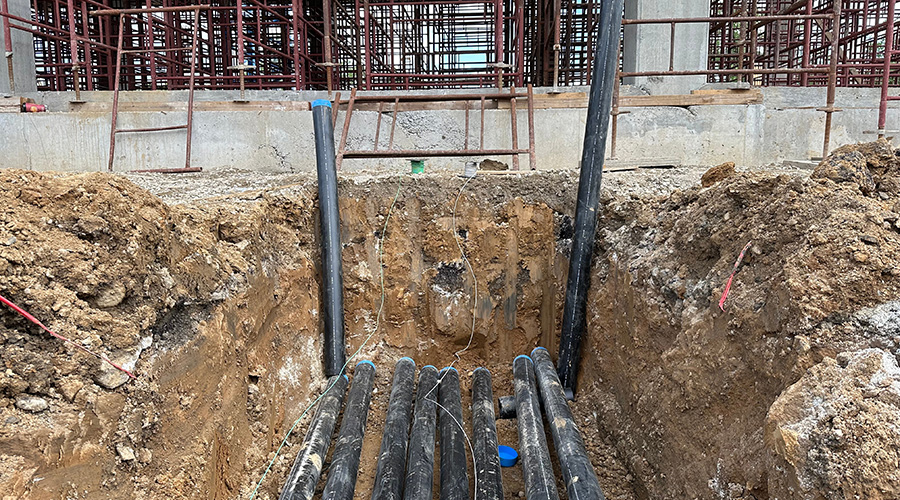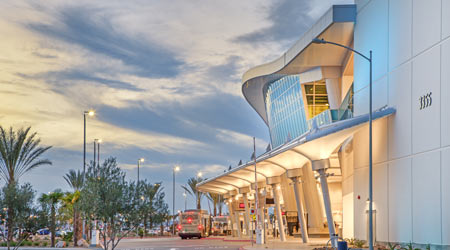« Back to Facilities Management News Home
« Design & Construction
Birdair: Company's Conical Canopies Welcome Visitors at San Diego Airport
San Diego, Calif. — Travelers seeking rental cars at San Diego International Airport’s (SDIA) recently opened consolidated rental car center now are welcomed by a beautiful new complex covered by 17 inverted PTFE (polytetrafluoroethylene) cone-structure canopies by Birdair (see photo).
Providing guests with relief from the San Diego’s famous sunshine, the structures — which consist of about 16,700 square feet of PTFE fiberglass membrane — also ensure that travelers can locate shuttles to the central rental car complex quickly and comfortably.
San Diego International Airport’s consolidated Rental Car Center features local, independent, and small business rental car companies as well as leading national rental car brands. For that reason, creating an open, inviting space that facilitates efficient and comfortable transportation was essential.
“Not only do the 17 new inverted cone structures create an iconic look for the Rental Car Center, but they’re also extremely functional in creating a central hub for the airport’s rental car companies,” said Tom Connell, business development manager, Birdair, Inc. “PTFE fiberglass is a uniquely versatile building material, physically and geometrically, and we think the completed project truly brings the potential of PTFE to life.”
Collaborating with Birdair, architecture firm Demattei Wong Architecture, Parsons Brinckerhoff/Simon Wong engineering, and general contractor Austin/Sundt joint venture worked to complete the new car rental center. But they needed something special to make the rental car center beautiful and unique while providing weather protection for the curbside walkways. They turned to Birdair, experienced in custom tensile structures, to oversee the design, fabrication, supply, and installation of the PTFE membrane, clamping, cables, and structural supporting steel.
Part of SDIA’s North Side Development plan, the new rental car center, which opened in January, is designed to dramatically reduce the number of shuttle buses circulating around the airport, allow the airport to maximize its 661-acre footprint and increase operational efficiency. Other aspects of the North Side development plan include a new receiving and distribution center, a new fixed-based operator complex serving general aviation aircraft, an on-airport roadway, and other roadway improvements.
Housing 12 rental car companies, a customer service building, a quick-turn-around car prep facility, and a 5,000-car ready/return area, the SDIA Rental Car Center is a massive 2 million-square-foot structure. Unlike the previous facility, the new center serves as a centralized hub for all rental car brands, using a single shuttle service to transport passengers to and from curbside. By eliminating brand-specific shuttles, rental car traffic is significantly reduced on Harbor Drive, as is shuttle bus traffic around the airport.
The new LEED Silver Certified Rental Car Center incorporates sustainable design principles such as use of alternative energy sources, recycled materials, renewable resources, and water-saving fixtures. The building uses photovoltaic solar power panels, increasing solar power generation to 2.5 MW and decreasing operational costs, while making a substantial long-term impact on the environment by reducing traffic, air pollution, and the rental car facilities' real estate footprint.
In addition, the 16 new shuttles operated by the Airport Authority are alternative fuel vehicles, as opposed to the 81 traditional shuttles that were used previously.
Fabric structures like PTFE membrane canopies are not only visually appealing but also bring numerous economic benefits to facilities in addition to environmental benefits. PTFE fiberglass is Energy Star and Cool Roof Rating Council certified and can reflect as much as 73 percent of the sun’s energy, and certain grades of PTFE fiberglass can absorb 14 percent of the sun’s energy while allowing 13 percent of natural daylight and 7 percent of re-radiated energy (solar heat) to transmit through.
The lightweight membrane also provides a cost-effective solution requiring less structural steel to support the roof or façade, enabling long spans of column-free space. In addition, membrane offers building owners reduced construction costs and maintenance costs compared to traditional building materials.
Fabric roof forms are curved between supporting elements in a manner reflective of the flow of tension forces within the membrane. With the exception of air-supported structures, these curvatures are anticlastic in nature. The curving forms of fabric roofs have dramatic appeal. Another attractive feature of tensioned fabric structures is their enormous range of spanning capability, perfect for the car rental center canopies.
Birdair, Inc. is a specialty design/build contractor of custom tensile structures throughout the world. In addition to pre-construction services such as design assistance, budgeting, construction methodologies, and project scheduling, Birdair provides design-build solutions in all aspects of project design, fabrication, installation, and maintenance. For more information, visit www.birdair.com.
More From 5/24/2016 on FacilitiesNet








